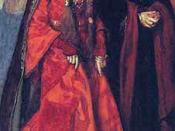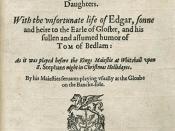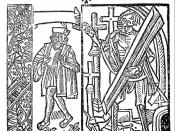Page numbers� PAGE \* MERGEFORMAT �1�
Omer Botenski
Survey of English literature from the middle ages to the interregnum
Dr. Aaron Landau
March 10th 2013
Elements of Social Criticism in "Everyman" and "King Lear"
In the following essay I will discuss, compare and contrast the elements of social criticism in two major works: the anonymous morality play "Everyman" and the tragedy "King Lear" by William Shakespeare [the first time you mention an author or critic you should bring the full name, settling for the last name in all future references]. I will start by providing a slight background about the time (works can't be written in social events) these two works were written in and their social concerns in order to lay a supportive base for my claims thatâ¦?. Everyman was written after 1485, in a society and time when religion and "the ultimate fate of the soul" (Norton, 463) were the central (but not the onlyâ¦) discourse.
And religion could be and was used to address a variety of social and earthly problems⦠Perhaps you would like to say that here if you are going to discuss social criticism in "Everyman" as your title suggest "King Lear"', however, was written in the beginningof the 17th century in England under the rule of James the first, in an era of political struggles, battles over family inheritance, personal gain by treason? and lies? Are there unique to that period? and most importantly, as Delany put it, a period in which "an uncertain balance has been struck in the transition between the feudal-aristocratic society ⦠[and] the emergent bourgeois state" (why do italicize? No need to bring the last name here, since you already introduced the text as Delany's, 429).


